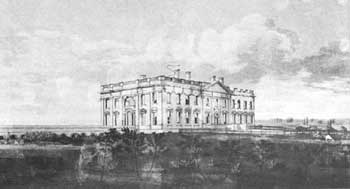





Historical Background
The War of 1812: Military Stalemate and National Awakening (continued)
THE NAVAL WAR: VICTORIES BUT NOT VICTORY
The U.S. Navy entered the War of 1812 slightly better prepared than the Army. The undeclared naval war against France, the pirate wars on the Barbary Coast, and other skirmishes had provided invaluable experience and esprit de corps. But the task of the Navy in the War of 1812 was herculean. Its 16 warships must combat the largest fleet in the world. The British would have numerical superiority in virtually any situation. Considering the odds, the Navy did well, but inevitably it was swept from the seas.
 |
| The White House after the British attack on Washington, August 24, 1814. From a drawing by W. Strickland. Courtesy, Library of Congress. |
At the beginning of the war, individual U.S. warships met and defeated individual British ships. Capt. Isaac Hull of the Constitution electrified the Nation in the summer of 1812 by outsailing a British squadron and then defeating the British frigate Guerriere. Not to be outdone were Commodore William Bainbridge, new commander of the Constitution, and Decatur, commanding the United States. In the course of 6 months they and supporting vessels managed to defeat three British frigates and two sloops-of-war. They lost but one ship, the Wasp. But U.S. naval ships were too few, and by 1814 only two frigates were at sea. The others lay blockaded in port.
U.S. privateers were more numerous and more successful. Privately financed and frankly committed to making money by attacking British merchant shipping, they carried the war to British waters. Lightly armed and schooner-rigged, they were strong enough to outfight a merchantman and fast enough to outsail British warships. During the war the privateers probably captured 1,300 British ships and cargoes worth $40 million. In spite of the danger, privateering was so lucrative that the Navy found it difficult to compete with the privateers in recruiting seamen. Ironically, most of the profit from privateering flowed to New England, which led the opposition to the war.
 |
 |
http://www.cr.nps.gov/history/online_books/founders-frontiersmen/intro10.htm
Last Updated: 29-Aug-2005